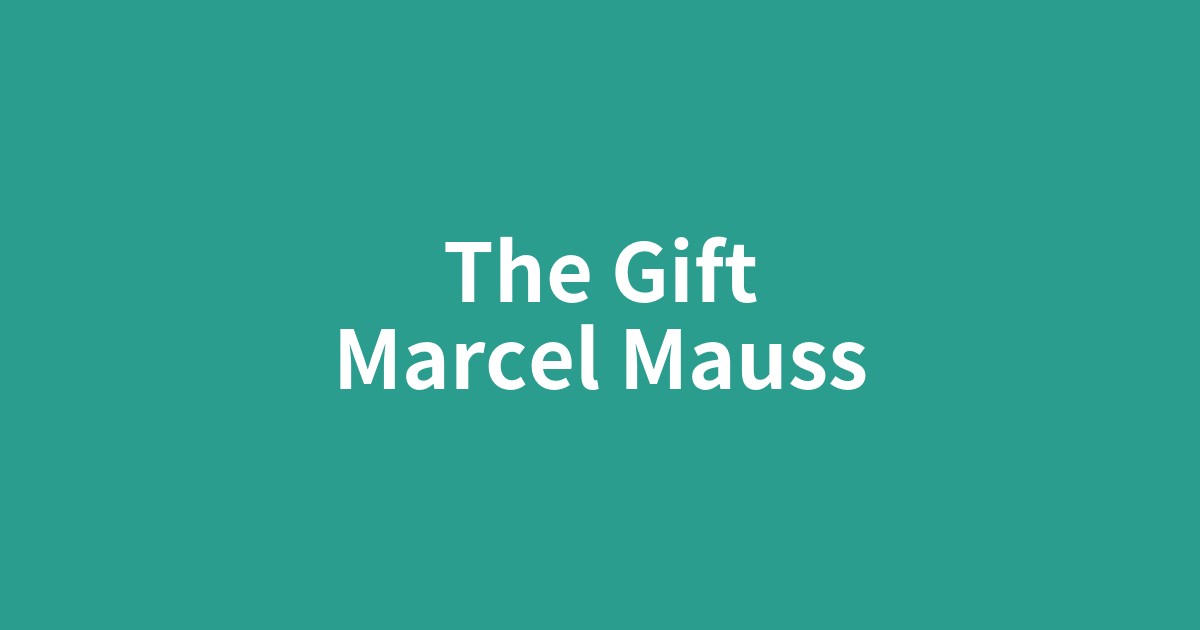このページは、歴史や文化の物語を楽しみながら、その文脈の中で重要な英単語を自然に学ぶための学習コンテンツです。各セクションの下にあるボタンで、いつでも日本語と英語を切り替えることができます。背景知識を日本語で学んだ後、英語の本文を読むことで、より深い理解と語彙力の向上を目指します。

贈り物には「与える・受け取る・お返しをする」というobligation(義務)が伴う。フランスの社会学者マルセル・モースが解き明かした、贈与交換の社会的な機能。
この記事で抑えるべきポイント
- ✓マルセル・モースの『贈与論』によれば、贈与には「与える義務」「受け取る義務」「お返しをする義務」という三つの社会的義務が伴うとされています。
- ✓贈与交換は単なる経済行為ではなく、個人や集団間の社会的な絆を形成・維持するための重要なメカニズムであるという見方があります。
- ✓北米先住民の「ポトラッチ」のように、贈与は時に社会的威信や地位をめぐる競争の手段となり、必ずしも友好的な行為とは限らない側面も持ち合わせています。
- ✓モースの理論は、現代社会におけるプレゼント交換やビジネス上の贈答、国際援助といった多様な現象の背後にある力学を読み解くための有効な視点を提供すると考えられています。
贈与論 ― なぜ人は贈り物をするのか
誕生日プレゼント、旅行のお土産、お歳暮。私たちはなぜ、これほどまでに贈り物をしあうのでしょうか。そして、何かをもらったら「お返しをしなければ」と感じるのはなぜでしょう。単なる親切心や思いやりだけでは、この奇妙な習慣のすべてを説明することはできません。そこには、もっと深く、社会的なルールが隠されているのかもしれません。この記事では、フランスの社会学者マルセル・モースの古典的名著『贈与論』を手がかりに、人間社会の根源にある「交換」の謎を探求していきます。
The Gift — Why Do People Give Gifts?
Birthday presents, travel souvenirs, holiday gifts. Why do we exchange gifts so frequently? And why do we feel we must 'give something back' when we receive one? Simple kindness and thoughtfulness alone cannot fully explain this peculiar custom. Perhaps there is a deeper, social rule hidden within. In this article, we will explore the mystery of exchange at the root of human society, using the classic work 'The Gift' by French sociologist Marcel Mauss as our guide.
贈り物に隠されたルール ― モースが説く三つの義務
モースは、未開社会とされた社会の交換システムを分析し、贈与には三つの義務が伴うと論じました。それは「与える義務(obligation to give)」「受け取る義務(obligation to receive)」、そして「お返しをする義務(obligation to reciprocate)」です。これは単なるマナーではありません。社会的な関係性を維持するための、一種の強制力を持った「義務(obligation)」なのです。例えば、誰かからの贈り物を無下に断れば、それは相手との関係を拒絶する意思表示と見なされかねません。このように、贈与は人と人とをつなぎ、社会を動かすための重要なメカニズムとして機能しているのです。
The Hidden Rules of Gifting — Mauss's Three Obligations
Mauss analyzed the exchange systems of societies considered 'primitive' and argued that gifting involves three obligations: the obligation to give, the obligation to receive, and the obligation to reciprocate. This is not just a matter of manners. It is an obligation with a kind of social force, essential for maintaining relationships. For instance, bluntly refusing a gift from someone could be seen as a declaration of rejecting the relationship with them. In this way, gifting functions as a crucial mechanism for connecting people and driving society.
富を破壊する儀式? ― 競争としての贈与「ポトラッチ」
モースの考察に大きな影響を与えたのが、北米の先住民社会で行われていた「ポトラッチ(potlatch)」という儀礼です。これは、首長がライバルとなる他の首長を招き、膨大な量の財産を気前よく贈与したり、時には目の前で破壊したりする儀式でした。一見、無駄で非合理的な行為に見えますが、その目的は自らの社会的「威信(prestige)」を誇示し、相手を圧倒することにありました。ここでは、贈り物は友情の証ではなく、社会的地位をめぐる闘争の武器となります。贈り物が、必ずしも個人の「寛大さ(generosity)」から生まれる友好的な行為とは限らない、という複雑な側面をポトラッチは教えてくれます。
A Ritual of Destroying Wealth? — Gifting as Competition in 'Potlatch'
A significant influence on Mauss's thinking was a ceremony practiced in North American indigenous societies called the 'potlatch.' This was a ritual where a chief would invite rival chiefs and generously give away vast amounts of property, sometimes even destroying it in front of them. At first glance, it seems a wasteful and irrational act, but its purpose was to display one's social prestige and overwhelm the rival. Here, gifts are not tokens of friendship but weapons in a struggle for social status. The potlatch teaches us the complex aspect that gifts do not always stem from the friendly act of personal generosity.
なぜお返しをしたくなるのか? ― 贈り物に宿る「ハウ」の力
では、なぜ受け取った側は「お返しをしなければ」という強い衝動に駆られるのでしょうか。モースは、ニュージーランドの先住民マオリ族の「ハウ(hau)」という概念にその答えを見出しました。ハウとは「贈り物の霊」とでも言うべきもので、贈られた品物には、もとの持ち主の霊的な力が宿っていると信じられています。このハウは、元の持ち主の元へ帰りたがると考えられており、受け取った人がお返しをしないと、ハウがその人に災いをもたらすとされました。物が単なる客体ではなく、人格の一部と見なされる世界観がそこにはあります。この考え方は、私たちがプレゼントに「心がこもっている」と感じる感覚と、どこか通じるものがあるかもしれません。
Why Do We Want to Give Back? — The Power of 'Hau' in a Gift
So, why does the recipient feel a strong urge to 'give back'? Mauss found the answer in the concept of 'hau' from the Māori people of New Zealand. Hau can be described as the 'spirit of the gift,' and it was believed that a spiritual power from the original owner resides in the gifted item. This hau is thought to want to return to its original owner, and if the recipient does not give something in return, the hau was believed to bring misfortune upon them. There is a worldview here where objects are not mere things but are considered part of a person. This idea might resonate with our own feeling that a present is 'thoughtful' or 'has heart'.
お歳暮から国際援助まで ― 現代に生きる贈与の論理
モースが分析した贈与の論理は、現代社会を読み解く上でも非常に有効です。ビジネスの世界における接待や贈答品、友人同士のプレゼント交換、さらには国家間の経済援助に至るまで、その背後には贈与の力学が働いています。これらの行為は、単なる経済的取引を超えて、関係性を構築し、維持するための「社会的絆(social bond)」を形成する役割を担っています。モースの研究は、文化「人類学(anthropology)」の枠を超え、経済学や社会学にも大きな影響を与え続けているのです。
From Holiday Gifts to International Aid — The Logic of the Gift in Modern Times
The logic of the gift that Mauss analyzed is also highly effective for understanding modern society. From business entertainment and corporate gifts to present exchanges between friends and even economic aid between nations, the dynamics of the gift are at play. These acts go beyond mere economic transactions, playing a role in forming and maintaining the 'social bond'. Mauss's work extends beyond the field of anthropology, continuing to have a major impact on economics and sociology.
終わりに
マルセル・モースの『贈与論』は、日常的な贈り物のやり取りが、実は人間社会を成り立たせるための根源的なルールに基づいていることを明らかにしました。贈与は、経済活動や個人の感情だけでは捉えきれない、社会的な絆を織りなすための複雑で力強いシステムなのです。次にあなたが誰かに贈り物をするとき、あるいは誰かから受け取るとき、その一つの行為に込められた深い意味について、少しだけ思いを馳せてみてはいかがでしょうか。きっと、日常の風景が少し違って見えるはずです。
Conclusion
Marcel Mauss's 'The Gift' revealed that the everyday exchange of gifts is actually based on a fundamental rule that constitutes human society. Gifting is a complex and powerful system for weaving social bonds, one that cannot be fully captured by economic activity or individual emotions alone. The next time you give a gift to someone, or receive one, why not take a moment to reflect on the deep meaning embedded in that single act? Surely, your view of everyday life will change, even if just a little.